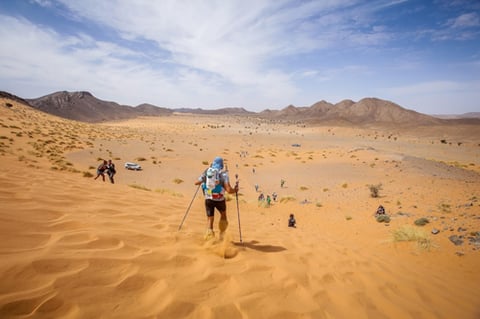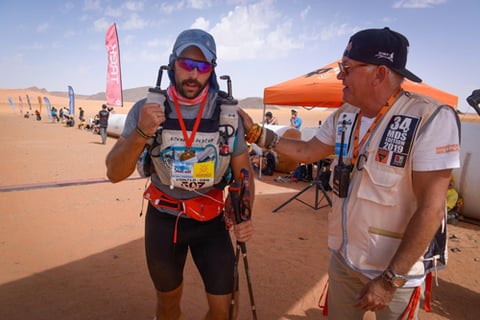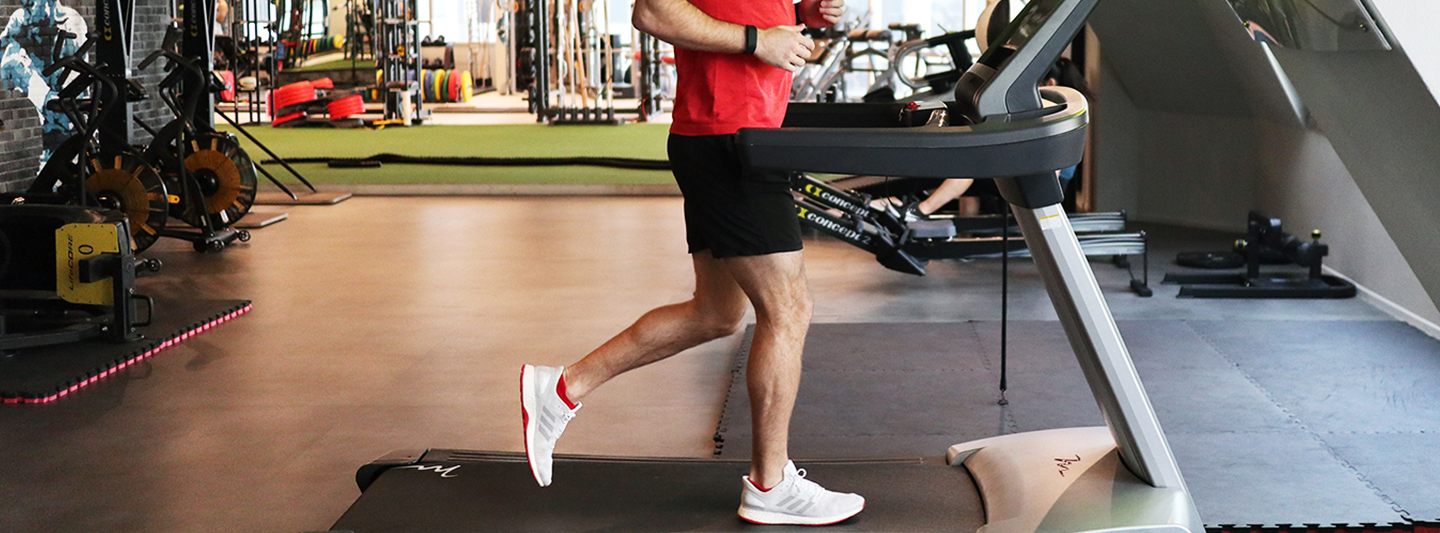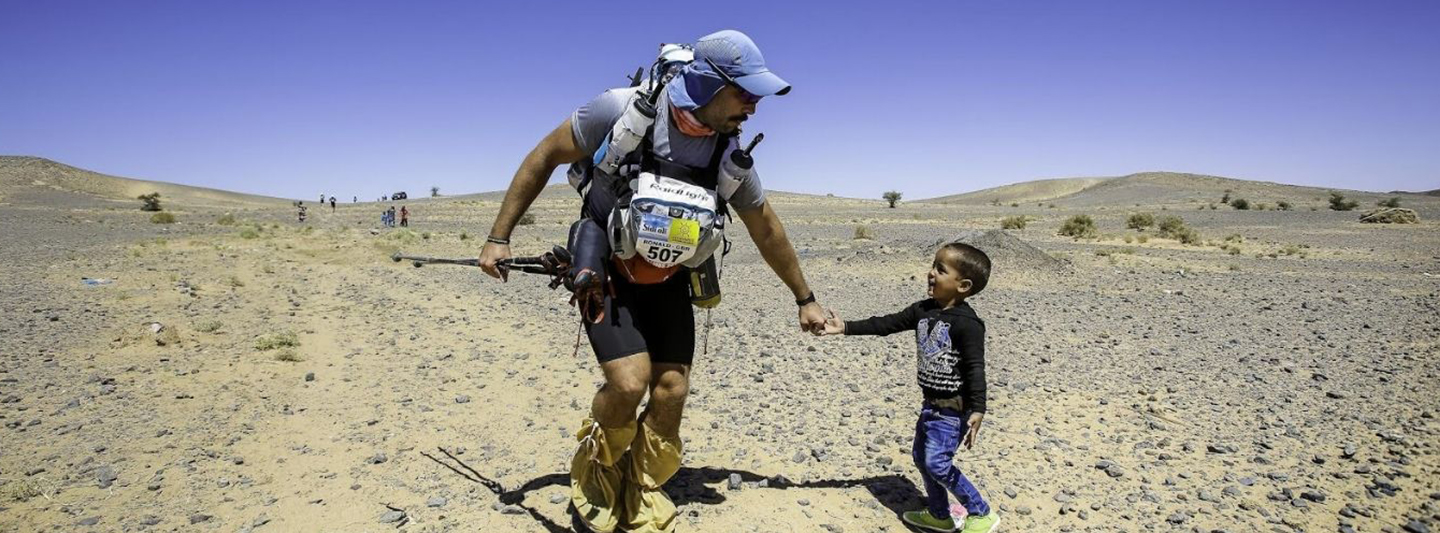While gyms across the world have shut their doors due to COVID-19, more people are running now than ever before.
In this article, we chat with Robbie MacGregor - a personal trainer at Core Collective and runner of Marathon des Sables (deemed the toughest foot race on Earth). He shares both his personal experiences and learnings, which are sure to inspire, motivate and help you reach your goals whether you run as a hobby, to maintain your fitness during the circuit breaker, or are training for your very first marathon!
What is Marathon des Sables?
Marathon des Sables (or MdS) is a foot race where runners cover 250km in 7 days through the Moroccan Sahara. Throughout the marathon, each participant carries his own backpack containing food, sleeping gear, and other essentials.
When did you complete Marathon des Sables and how long did you take to train for it?
I ran MdS last April. The 35th edition is actually due to be on at the moment, but has been cancelled like most sporting events in the world.
I trained really hard for about 10 months, but I was already quite fit beforehand. I had a good base layer of fitness, but had never done any distance running. At the time, the longest I had ever run was 3km and running gave me a sore back. In the run up to the race I was averaging about 100km in training a week, so several training marathons each week and it required a massive change in mindset towards training from strength training and team sports to endurance and aerobic capacity training.

Tell us more about your experience completing Marathon des Sables.
The experience of MdS is super unique. It’s quite survivalistic and presents a lot of challenges that a normal marathon doesn’t. The race is extremely isolated and remote, so you’re completely self-sufficient; you have to carry all your own food, sleeping bag, and clothes. It’s a difficult experience to convey, it’s very primal and quite brutal. I found the experience as a whole to be extremely challenging but equally gratifying.
What was your first ever marathon and what made you consider doing it?
The first marathon I signed up for was MdS. The first marathon I ran was the Standard Chartered marathon in Singapore, and I entered it as a training run.
I got it totally wrong…
I hadn’t worked out a proper nutrition and hydration strategy - I just went and ran the race. It was a total disaster. I collapsed over the finish line with dangerously low salt levels. I had to be hooked up to an IV and monitored by the medical team - it was pretty humbling.
However, I learned some great lessons from this race. I never let my salt levels get too low again and I became extremely detail-oriented with my hydration. At one point during the MdS my salt levels actually got a bit low and I knew exactly what to do.
How did you feel after completing your very first marathon, and what were your greatest takeaways from the experience?
After the Singapore marathon went so badly wrong for me, I went back to the drawing board. I felt that it was super valuable for me to mess it up so much because when it came to running MdS, I was prepared.
On Training For Your First Marathon
How long in advance do you suggest starting training for a marathon?
A 12 week program would be great for someone who is already quite fit.
If this is an everest type goal, like MDS was for me, probably longer. I did 10 months and it was perfect. You can achieve a hell of a lot in 6-12 months!
How would you suggest panning out nutrition/diet when training for a marathon?
This is probably the most overlooked part of the training process. So much ground can be gained here so I would really recommend working with a coach.
There are some basic tips that can apply to everyone.
Control your nutrition so you lose weight in the build-up to the race. You want to aim to lose your non-functional weight. The Journal of Applied Physiology and Occupational Physiology studied the effect of running while carrying increasing loads on the cardiorespiratory system and found that for every extra kilogram the runner carried, the heartbeat increased by 1.1beats/min, oxygen intake increased by 33.5ml/min and pulmonary ventilation increased 0.6l/min. The takeaway? Get lean and run light. It makes a massive difference!
Practice and experiment to find what is right for you during the race. It’s really important to work out how much salt and electrolytes you need to take while running and how much food you can digest, this is especially important if you’re thinking about doing an ultra. Work this out in your training, if you get thirsty or dehydrated in a race, it might already be too late.
If you’re in a hot country like Singapore I would recommend one salt tab or electrolyte for every litre of water you consume and one small serving of food every hour, 100-200kcal (gels, bars, banana, chocolate - all good).

We often hear that runners should avoid strength training because it’ll make them more bulky and heavy. Do you recommend strength training for those training for a marathon?
I definitely recommend strength training. It's essential yet often overlooked. Two strength sessions a week can make a massive difference.
If we approach our training from a purely physiological stance, there are only three ways you can improve your running.
-
Improve our VO2 max, and push it towards our genetic capacity.
-
Increase our lactate threshold, although some debate still remains on how much we can move the needle here.
-
Improve our running economy.
Proper strength training has been proven countless times to improve run economy. Approximately 20% of expended energy while running is spent stabilizing in the frontal plane, so anti-rotation and core strength is extremely important. Heavy strength training has also been shown to improve musculo-tendon stiffness and neuromuscular efficiency. The increased stiffness and responsiveness of the muscles leads to shorter ground contact times and less oxygen consumed at a given pace.
All runners should encompass strength training into their running program.
What would you suggest in terms of physical training structure for first-time marathoners?
Three runs a week and one to two strength sessions would be my go-to protocol. First-time runners could try a training schedule that looked something like this:
Monday - Recovery run
Tuesday - Strength & Conditioning
Wednesday - Tempo run
Thursday - Strength & Conditioning
Saturday - Long run
This is a basic training structure. However, runners can contact me for customised running or strength and conditioning programs, as well as 1:1 coaching when the COVID-19 outbreak has settled down.
Do you have any strategies to overcome mental blocks or self-doubts when running marathons?
Anything difficult becomes a huge mental challenge, and anything worth doing is probably quite difficult. “Insert your favourite inspirational quote here”.
Train your brain. Hard times don’t last, hard people, do.
Get the really hard stuff done in training long before your race. If you train hard and go into a race feeling prepared, you’ll have confidence in yourself to execute at a higher level. This probably applies to way more things than just running or sports.
Any tips for post-marathon recovery?
Recovery does not mean stop being active. I repeat, recovery does not equal inactivity! This is super important. However, after a marathon, your nervous system can get pretty beaten up so even if your musculature feels good, it might be smart to have a deload week in your training.
When recovering, stick to low-intensity exercise like yoga, walking, cycling or swimming. Give your nervous system time to recover from the race, so steer clear of max-effort deadlifts or intense CrossFit and HIIT classes - but don’t do nothing at all. You’ll actually slow down your recovery and can make resuming training harder.
Finally, what would you tell someone who is considering but on the fence about running their first marathon?
Go for it! You won’t regret it. Doesn’t matter who the person is - it could be a complete beginner or a really experienced runner, but I think everyone has something to gain from these types of challenges. Even if it ends in misery like my first one did, you’ll grow as a runner. Win or learn.
Contributor:

Robbie McGregor is a trainer with more than 10 years of experience in the fitness industry. An ex-rugby player with a Masters in Economics, he spent years working as a financial analyst before returning to his true passion of coaching and personal training.




